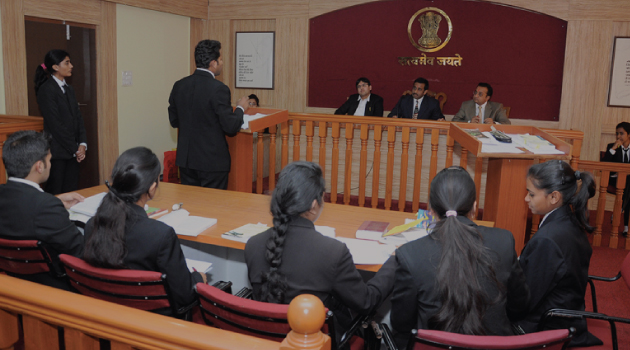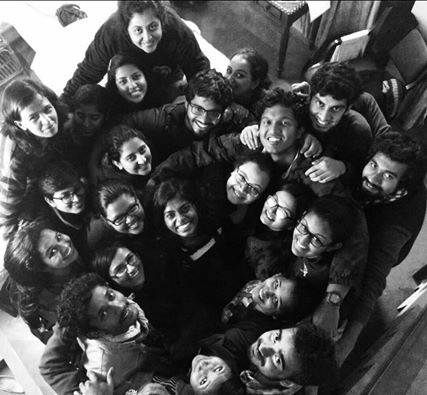Criminal Law and Justice– The Top 7 Careers
 Ashish Goel is a student at the National University of Juridicial Sciences. He blogs here about criminal law and justice. Criminal law is that branch of law that deals with legal cases related to criminal offences. Most court scenes you see in Bollywood movies are criminal law in practice, though we need hardly tell you that that’s not all criminal law is about. Thinking about a career in this interesting field? Ashish tells us about the top 7 career paths you might want to consider.
Ashish Goel is a student at the National University of Juridicial Sciences. He blogs here about criminal law and justice. Criminal law is that branch of law that deals with legal cases related to criminal offences. Most court scenes you see in Bollywood movies are criminal law in practice, though we need hardly tell you that that’s not all criminal law is about. Thinking about a career in this interesting field? Ashish tells us about the top 7 career paths you might want to consider.
1. Criminal Law Practitioner / Litigation: — The idea is to start a small office at your own residence, make contacts at local police stations, know your clients, get involved in local politics and the field is yours. Take every case that comes before you, be it a bail or a maintenance case, and see how quickly you shine in your district. Make sure you have good research skills and kickass precedents with you, and when you argue before a Judge, be humorous. Criminal litigation, they say, is highly rewarding and you earn from the first day itself. Slog for two years, sweat, and then see the results. See the Standard Chartered Bank case to know why corporates need criminal attorneys.
Don’t go and work under a Senior Lawyer. Don’t waste your time. Start practising independently. When in law college, intern properly under a top notch lawyer to learn the way petitions are drafted, his way of arguing, how he impresses a Judge. Intern also under a Munsi/office clerk to know the court procedure. So that right after your law school with some internship experience, you are able to work independently. Work for yourself. This increases efficiency.

2. Judicial Clerkship under Appellate Courts (Criminal Division): –– Judicial Clerkships will help you in every field you wish to pursue. If you want to pursue your masters in criminal laws from a top UK or US University, that too on a full scholarship, go for a Judicial Clerkship (JC). Try to do it under a Judge of High Court or Supreme Court. The easiest way to find out about reputed and knowledgeable Judges in criminal laws is to go through some landmark judgement on criminal laws and look who had written the majority judgement. It is advised to address a letter to the Registrar but directly talking to the Judge is not discouraged. For an official position after you graduate, there is a call for application for the post of Research Assistant and the Registrar of the SC notifies the same to recognised law schools as also on the SCI website. Know about JC more here.

3. Lecturer in Criminal Laws: –– Lecturers in big law schools are well paid. There are other merits like: feeling a sense of responsibility and innovation, meeting classroom challenges, getting research grants from outside sources, respect in fraternity, among others. But the most important part in law teaching is the fact that you can join a university that is the best in your home town.
You would need a Masters in Law from a recognised university. You can also be a Tutor in a law varsity in the UK if you have a reputed LLM Degree from the UK. Your promotion chances are awesome if you show a standard level of dedication. You are advised to complete a Refresher’s Course that is available for improving chances of promotion. If you are a student enrolled in a law university, catch up with the criminal law professors and convince them to offer you classroom teaching for a month or two in any subject of your interest. Plus there are tutorials in almost all law schools and if you successfully complete the programme, it guarantees a teaching job in any good university.

4. Joining law firms specializing in Criminal Laws: — You get to work and specialize in your area of interest. This position will usually demand aid in research and drafting petitions. Law firms normally have lawyers on an independent basis who represent the firm in courts. Not all firms in India practice in criminal litigation. But there are firms like O P Khaitan and Co., Rajesh Sangani Law Firms, Jotwani Associates, Trustman and Co., Leges Juris Associates, B. S. Jain and Co. which are worth the consideration.
5. Research Fellowships or Research Assistantships: –– Various law schools in India, UK and US among others have a Centre for Criminal Justice Studies. To be specific, in USA, Centre for Crime and Justice at NYU, International Center for Criminal Justice at HLS, Criminal Justice Policy and Management at Harvard Kennedy School, and in the UK the Centre for the Study of Human Rights at LSE, Criminal Justice Centre at Warwick, Centre for Criminal Justice Studies, Leeds. In India, go for Centre for Penology, Criminal Justice and Police Studies at Jindal Global Law School.
The Director/Faculty Advisor of the Centre can be easily contacted through emails. The contact details are provided in the respective websites. Some of the Centres also provide student internships, although they are normally unpaid positions. It depends how diligently you use this information to get a position in any of these Centres. They will not entertain your Statement of Purpose unless it shows demonstrated interest in criminal law with substantive evidence in the form of publications, conference papers and moots. If selected for a fellowship, you get the opportunity to research under the Center and also take classes. Chances are they will absorb you. To have a general overview of potential applications for research internships, see this post.
6. Joining organisations dedicated to Criminal Justice: –– Although not lucrative instantly, these research positions can change your lifestyle for sure. You do not only get to work with the most influential people in India but also get an opportunity to become a change-maker. Be it constant writing on criminal justice issues in newspaper columns, member of Working Paper Series, part of Policy Comments, your interest in criminal law scholarship will be served well. Some of the noted positions for this area are Commonwealth Human Rights Initiative (CHRI), Criminal Justice Initiative at Human Rights Law Network (HRLN), International Relations and Security under Ved Marwah (Centre for Policy Research), Institute of Social Sciences, New Delhi.

7. Starting your own criminal law firm: — Please browse through some good posts on how to start your own law firm. It is suggested to earn some money before starting your own law firm. Try to connect with law graduates who are interested in opening partnership businesses.
Start with one city in mind. Considering you are a fresh start-up firm, the idea is to get a good flow of clients. You also have to identify why a person or a client would not just come to you but stick with you. You must understand that the way the market will judge you is in terms of how much field experience or goodwill you carry. To the clients, you must look like a professional lawyer in terms of experience and expertise for them to trust you with their cases. Performance comes later. If you can get a good flow of clients, which normally happens through alliances, connections or outsourcing, the performance and the goodwill spreads through word of mouth publicity.
Launching yourself – Your team has to be right, a lot of marketing is required in the first year, and you need to network with the right group. It is never easy to launch yourself. But once you do, the returns are good. If you are qualified it will boil down to personality, merit and drive; and how efficient your team is.
The gist is, do what your heart tells you to; but do your ground work well. Make a good blueprint of what you want to do. Stare at it and re-read it again. Get a very clear idea of what you want, and make sure the steps are correctly charted. If your groundwork is done right, things should fall in place.
This is a modified version of the original post on the blog called “Breaking the Code of Criminal Procedure”. We hope it was helpful, and if you have any doubts related to careers in criminal law, please do post them in the comments.



